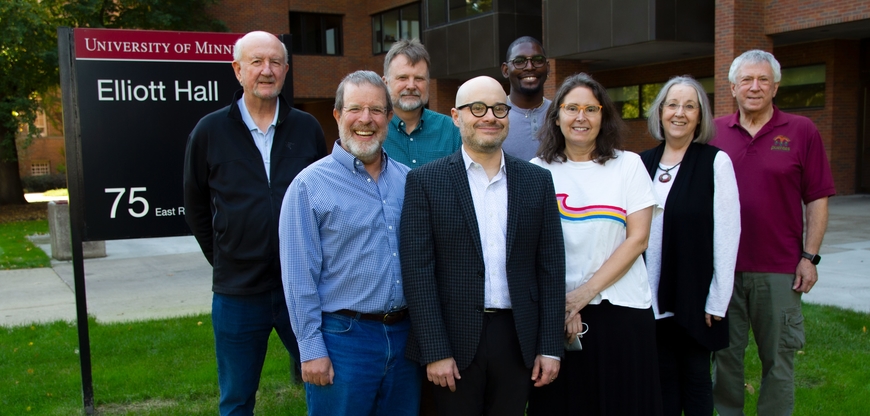Social Psychology

The social psychology graduate training program focuses on both basic and applied research in social and personality psychology, with an emphasis on developing research skills through course work, research experience with area and affiliated faculty members, both in the laboratory and in the field, and interdisciplinary research opportunities. Areas of specialization (both in research and curriculum) include:
- social cognition
- social perception and interpersonal behavior
- culture
- social psychology and law
- political psychology
- attitude formation and change
- persuasion and social influence
- health behavior change
- self-control
- self and identity
- self-presentation
- conflict and forgiveness
- stereotyping and prejudice
- intergroup relations
- dyadic social interaction and strategic social communication
- prosocial action and citizen participation
- interpersonal relationships
- emotion
- stress and coping
- subjective well-being
- personality and social behavior
Curriculum
Our goal in the graduate training program in social psychology is to prepare students to test, refine, and develop theory by means of rigorous empirical research, and to apply social-psychological constructs, findings, and theory to issues and problems of practical social import. Toward that end, we expose students to classic and contemporary knowledge in social psychology, and to the methodological skills needed to make significant contributions to both basic and applied social-psychological research.
We offer a broad spectrum of core courses in our curriculum, including courses on the conceptual and methodological foundations of social psychology (e.g., our courses on Principles of Social Psychology and Research Methods in Social Psychology), seminars on professional issues (e.g., our Proseminar in Social Psychology), and major substantive areas of theory, research, and application (e.g., our courses on Attitudes and Social Behavior, Interpersonal Relationships, Applied Social Psychology, Personality and Social Behavior, Social Psychology and Health, Social Cognition, Impression Management, Prejudice and Intergroup Relations, and The Self).
In addition, students in social psychology receive training in statistics and quantitative methods through course offerings in the Department of Psychology, as well as relevant courses offered in the College of Education and Human Development, the School of Public Health, and the School of Statistics.
Please visit the Graduate Education Catalog: Psychology for curriculum requirements specific to the Social Psychology program.
Research
Our program offers research opportunities in many areas. The program focuses on a wide range of theory and research that address intrapersonal, interpersonal, and intergroup phenomena. Faculty and students conduct research in a variety of specialties, including, but not limited to, those noted above. We emphasize research collaborations with different faculty members, and value both basic and applied research (as well as their integration), conducted both in laboratory and in field settings. The Social program faculty and students actively collaborate with other researchers in the Department of Psychology, in other academic departments in the University, and in other institutions across the Twin Cities area and nationally and internationally. These productive collaborations are institutionally supported by a number of interdisciplinary research centers, such as the Center for the Study of Political Psychology and the Center for the Study of the Individual and Society, and by a number of interdisciplinary graduate minor programs, such as the Political Psychology minor and the Interpersonal Relationships minor, in which faculty from several disciplines are actively involved.
Research programs led by our faculty are funded by a wide variety of sources, including federal agencies and private foundations, with many grants providing funding opportunities to support graduate students in the course of their doctoral studies. Please visit faculty lab websites to learn more about their ongoing research.
Moreover, because a number of social psychologists have academic homes elsewhere in the University of Minnesota, we encourage students to take advantage of opportunities in other academic units of the University, such as the Carlson School of Management, the School of Public Health, the Institute of Child Development, the Department of Educational Psychology, the Department of Family Social Science, the Department of Sociology, the Department of Political Science, the Department of Food Science and Nutrition, the School of Journalism and Mass Communication, the Law School, and the Medical School.
In addition, the metropolitan area of Minneapolis and St. Paul provide students access to many community agencies, foundations, and private enterprises that not only participate in research, but also provide employment opportunities at predoctoral and postdoctoral levels.
This extraordinary variety of resources within the Department of Psychology, the University of Minnesota, and the surrounding metropolitan area affords students the opportunity to tailor their graduate training to meet their individual professional goals and interests. Whether students aspire to academic research and teaching careers at liberal arts colleges or at large research universities, or to careers in non-academic settings, our graduates are well-equipped with the substantive and methodological expertise to participate meaningfully and productively in the generation and application of social-psychological knowledge.
Funding Opportunities
What funding do students receive? Please refer to the Department of Psychology Funding Opportunities webpage for more information about fellowships, scholarships, research assistantships, and teaching assistantship.
Core Faculty
Eugene Borgida, Professor
Christopher M. Federico, Professor
Marti Hope Gonzales, Associate Professor
Drexler James, Assistant Professor
Traci Mann, Professor
Alexander Rothman, Professor, Area Director
Jeffry A. Simpson, Professor and Department Chair
Mark Snyder, McKnight Presidential Chair
Emeritus Faculty
Ellen Bercheid, Regents Professor of Psychology Emerita
Affiliated Faculty
Patricia A. Frazier, Distinguished McKnight University Professor
Paul Goren, Political Science
Vladas Griskevicius, Dept of Marketing at Carlson
Barbara Loken (Emeritus), Carlson School of Management
Glenn Roisman, Institute of Child Development
John Sullivan (Emeritus), Political Science